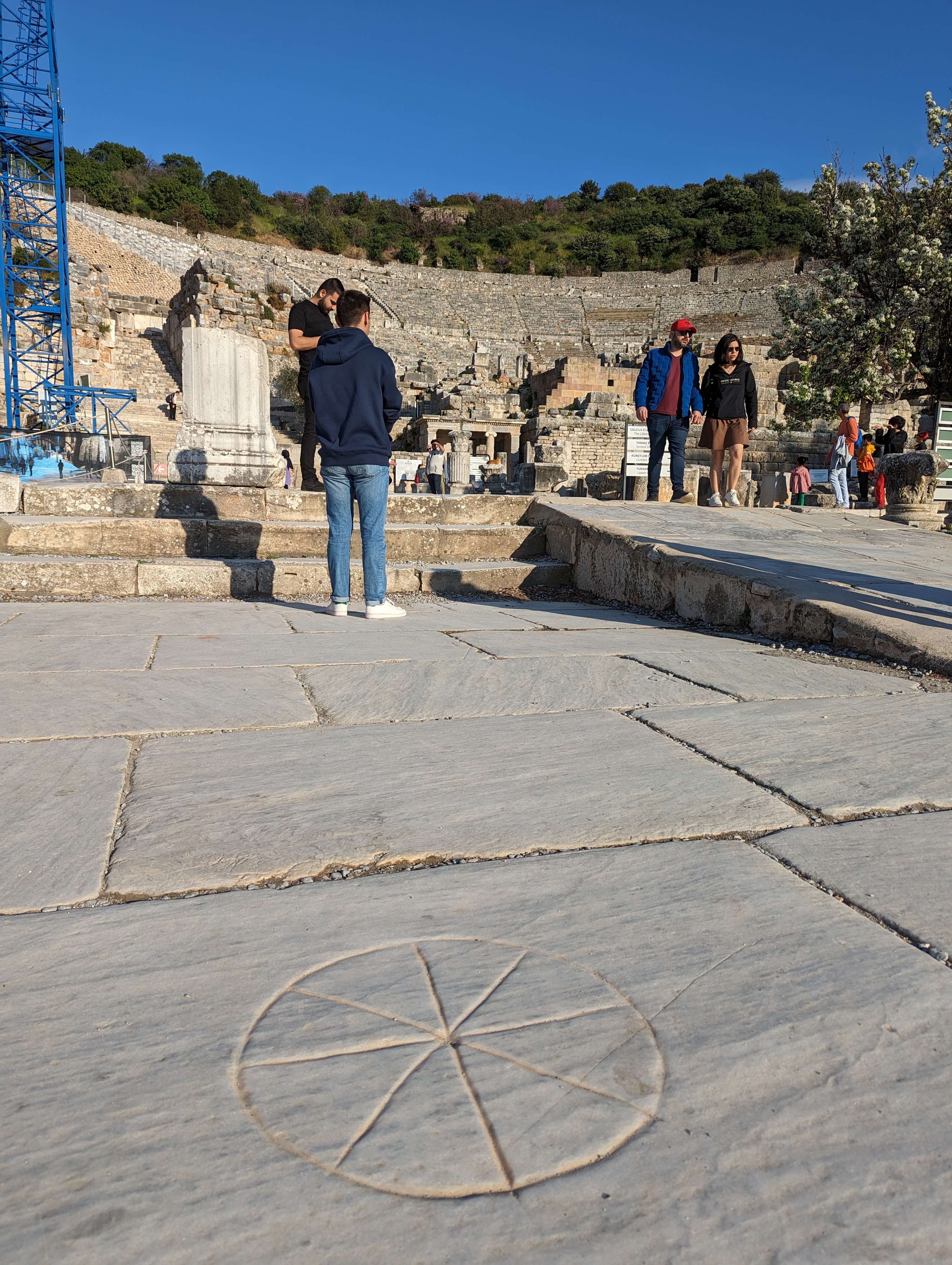No Little Disturbance in Ephesus
July 7, 2024
One of my favorite stops on our trip this year was Ephesus. Located in western Turkey,
straight across the Aegean Sea from Greece and to the south of ancient Troy, Ephesus was
a major port city and one of the richest in Asia. It was also firmly in the grip of the
Roman Empire.
In 55 AD, there was a disturbance in Ephesus that was recorded for us, quite vividly, in
history. The roots of this disturbance began in 53 AD when a Jewish man, born further
east in southern Turkey, arrived in the bustling port city.
While Apollos was in Corinth, Paul passed through the interior regions and came to
Ephesus, where he found some disciples.
Acts 19:1
Acts 19:1
You can imagine him walking down this street, lined on both sides with small shops, that
leads directly to the port where people and goods from Greece, Egypt, and Rome arrived
daily.
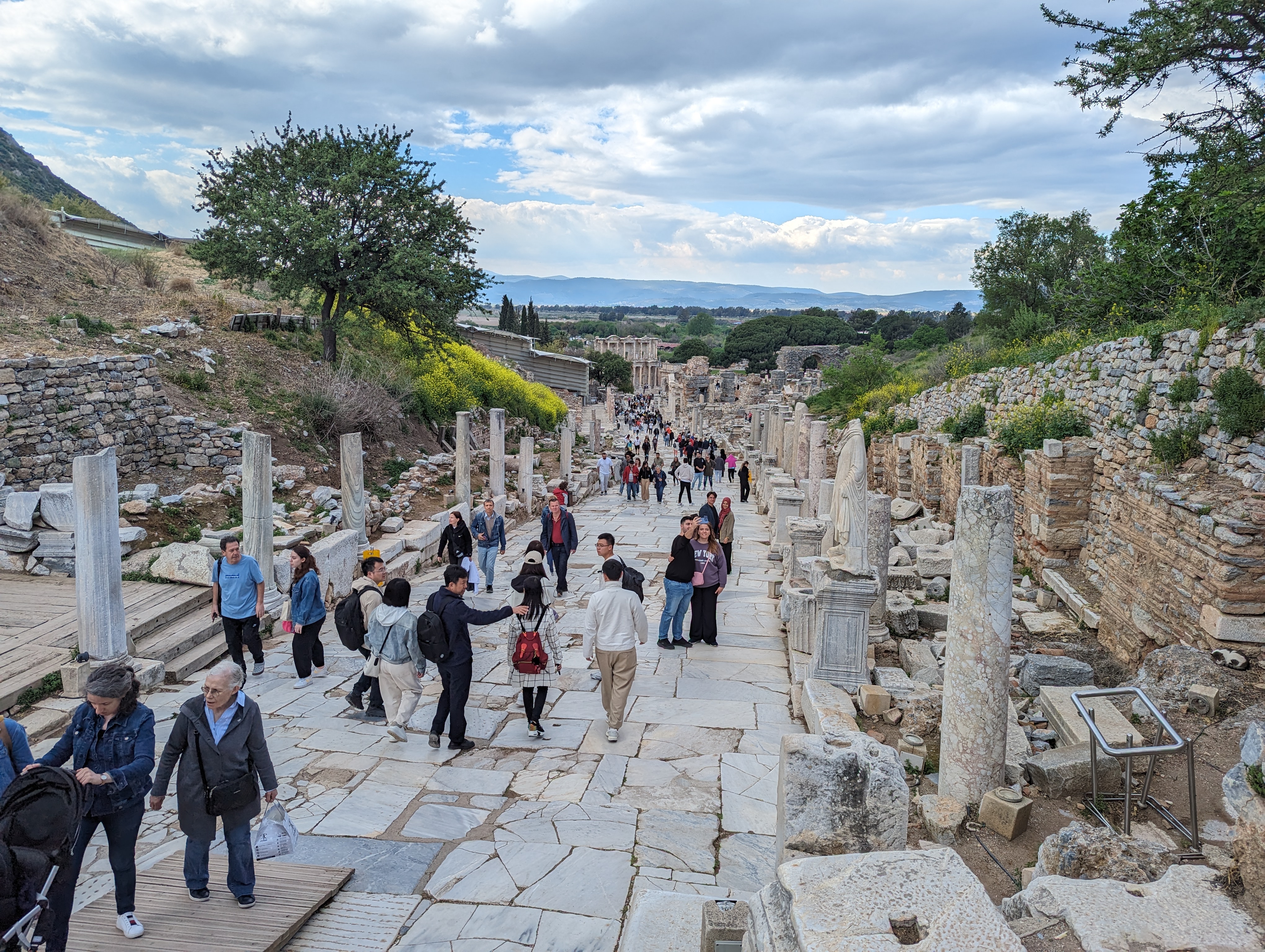
Paul spends the next few years in Ephesus, debating first in the local synagogue, and
then in a local lecture hall.
He entered the synagogue and for three months spoke out boldly, and argued persuasively
about the kingdom of God. When some stubbornly refused to believe and spoke evil of the
Way before the congregation, he left them, taking the disciples with him, and argued
daily in the lecture hall of Tyrannus.
This continued for two years, so that all the residents of Asia, both Jews and Greeks, heard the word of the Lord.
Acts 19:8-10
This continued for two years, so that all the residents of Asia, both Jews and Greeks, heard the word of the Lord.
Acts 19:8-10
Both the lecture hall of Tyrannus and the synagogue are lost to us today, but there is
some indication that the lecture hall was replaced by the Library of Celsus (pictured
left below, and also at the tail end of the street in the first picture) when it was
built in the 110s AD. We found a Menorah (pictured right) carved into the stone steps of
the Library of Celsus, a reminder of just how diverse, yet recognizable, this
magnificent city was two thousand years ago.
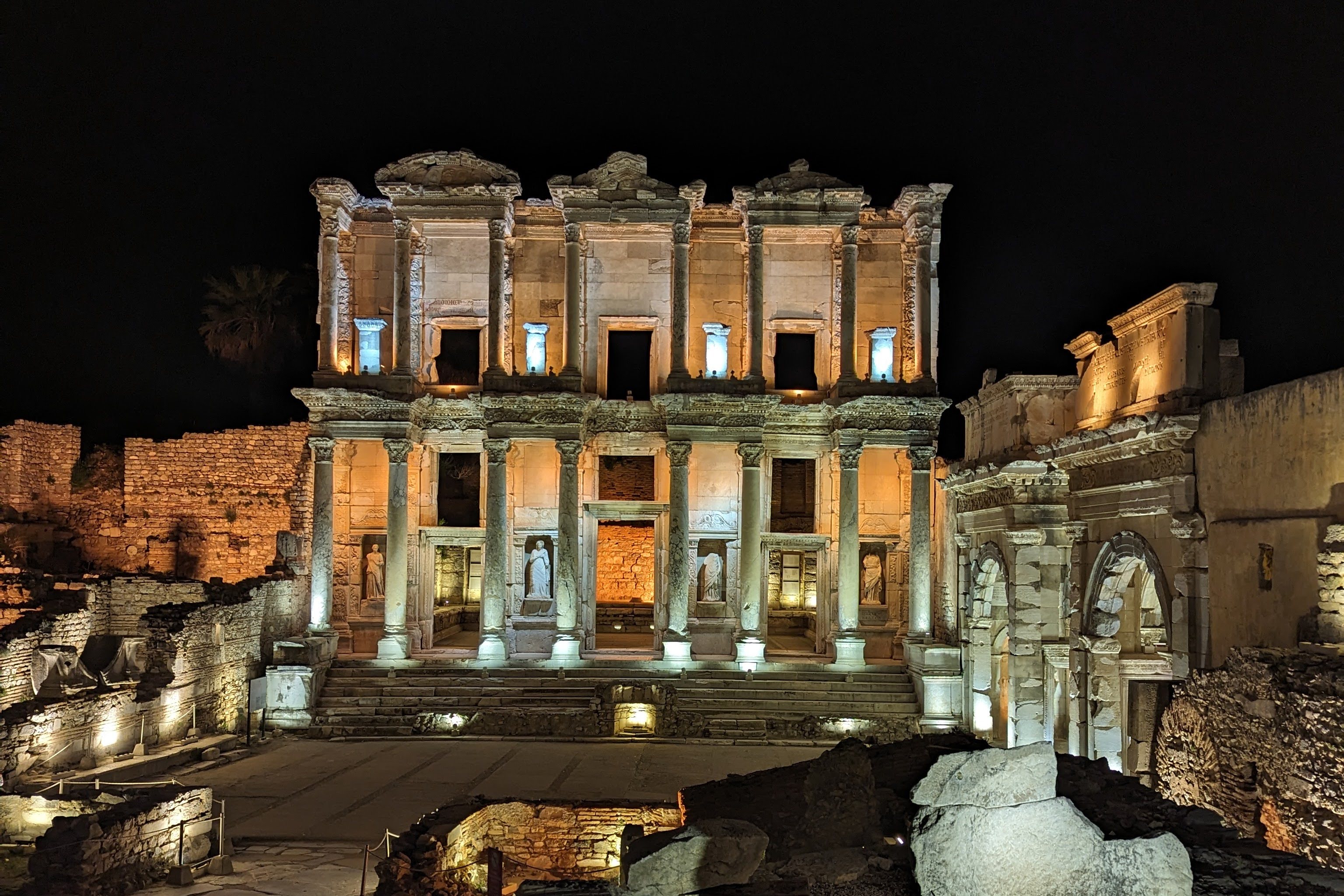
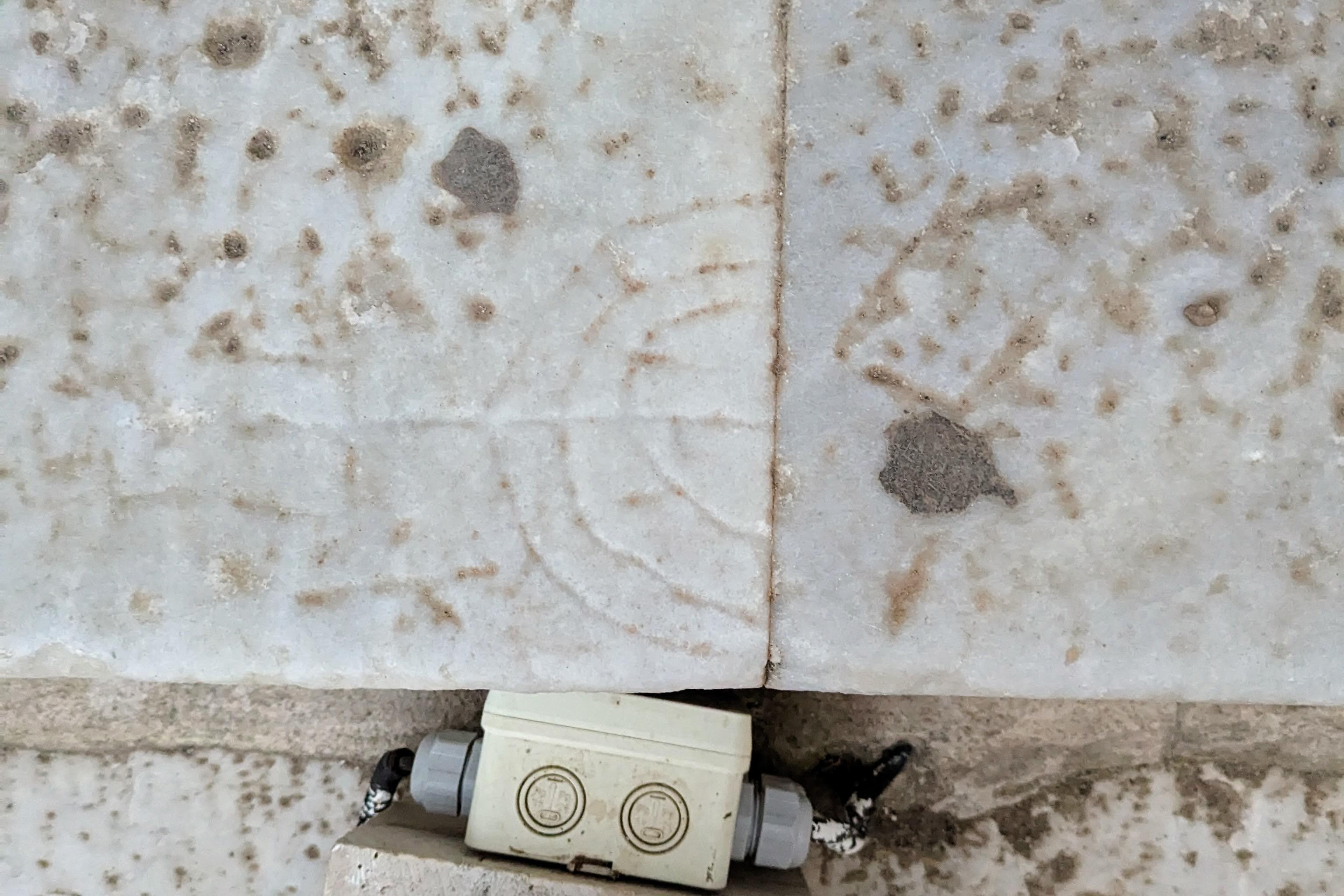
After a few years in Ephesus, Paul decides to hit the road again and keep making his way
toward Rome:
Now after these things had been accomplished, Paul resolved in the Spirit to go through
Macedonia and Achaia, and then to go on to Jerusalem. He said, “After I have gone there,
I must also see Rome.” So he sent two of his helpers, Timothy and Erastus, to Macedonia,
while he himself stayed for some time longer in Asia.
Acts 19:21-22
Despite Roman era Jews and early Christians (who, like Paul, were mostly Jewish at the
time) featuring in the story so far, Ephesus was not a Christian town. Far from it. In
fact, the Temple of Artemis, one of the Seven Wonders of the Ancient World, had been
funded by the Ephesians themselves after an arsenist burned down an earlier version in
356 BC.
I have set eyes on the wall of lofty Babylon on which is a road for chariots, and the
statue of Zeus by the Alpheus, and the hanging gardens, and the colossus of the Sun, and
the huge labour of the high pyramids, and the vast tomb of Mausolus; but when I saw the
house of Artemis that mounted to the clouds, those other marvels lost their brilliancy,
and I said, "Lo, apart from Olympus, the Sun never looked on aught so grand".
Antipater, Greek Anthology IX.58
The Temple was a huge deal. The site of worship for people going back centuries, it was
also an economic engine for the city. Priests, prostitutes, artisans, and farmers would
all do regular business at and be closely interlinked with the temple's success.
Out of the wide variety of citizens in Ephesus, there was one group that refused to
enter into the temple's orbit. Jews, believing that their God was the one true God,
and the only one deserving worship, were the exception to the rule. But given that they
were a minority, with a religion so ancient as to deserve some level of mystical
respect, the locals gave them a pass.
So it must have been a shock when, in just a few years, a small community of Ephesians,
not clearly defined by one race or religion (indeed, they would later be deemed
"athiests" by the Roman authorities), stopped engaging with the temple. The story picks
back up around 55 AD:
About that time no little disturbance broke out concerning the Way. A man named
Demetrius, a silversmith who made silver shrines of Artemis, brought no little business
to the artisans. These he gathered together, with the workers of the same trade, and
said, “Men, you know that we get our wealth from this business. You also see and hear
that not only in Ephesus but in almost the whole of Asia this Paul has persuaded and
drawn away a considerable number of people by saying that gods made with hands are not
gods. And there is danger not only that this trade of ours may come into disrepute but
also that the temple of the great goddess Artemis will be scorned, and she will be
deprived of her majesty that brought all Asia and the world to worship her.”
When they heard this, they were enraged and shouted, “Great is Artemis of the
Ephesians!” The city was filled with the confusion; and people rushed together to the
theater, dragging with them Gaius and Aristarchus, Macedonians who were Paul's travel
companions.
Acts 19:23-29
The Ephesian theater, only a short walk past the Library of Celsus, is pictured left
below. It is easy to imagine the crowd, spurred on by wealthy artisans fearing their
livelihoods, rushing in from the bustling city outside to bring these two troublemakers
to justice.
On the right is a statue of Artemis from the Ephesus museum. The temple itself would
have contained a similar one carved from wood, painted, and adorned with jewelry. This
model and numerous other variations - big and small, for official and personal use -
were crafted with great skill by artisans like Demetrius and his colleagues.
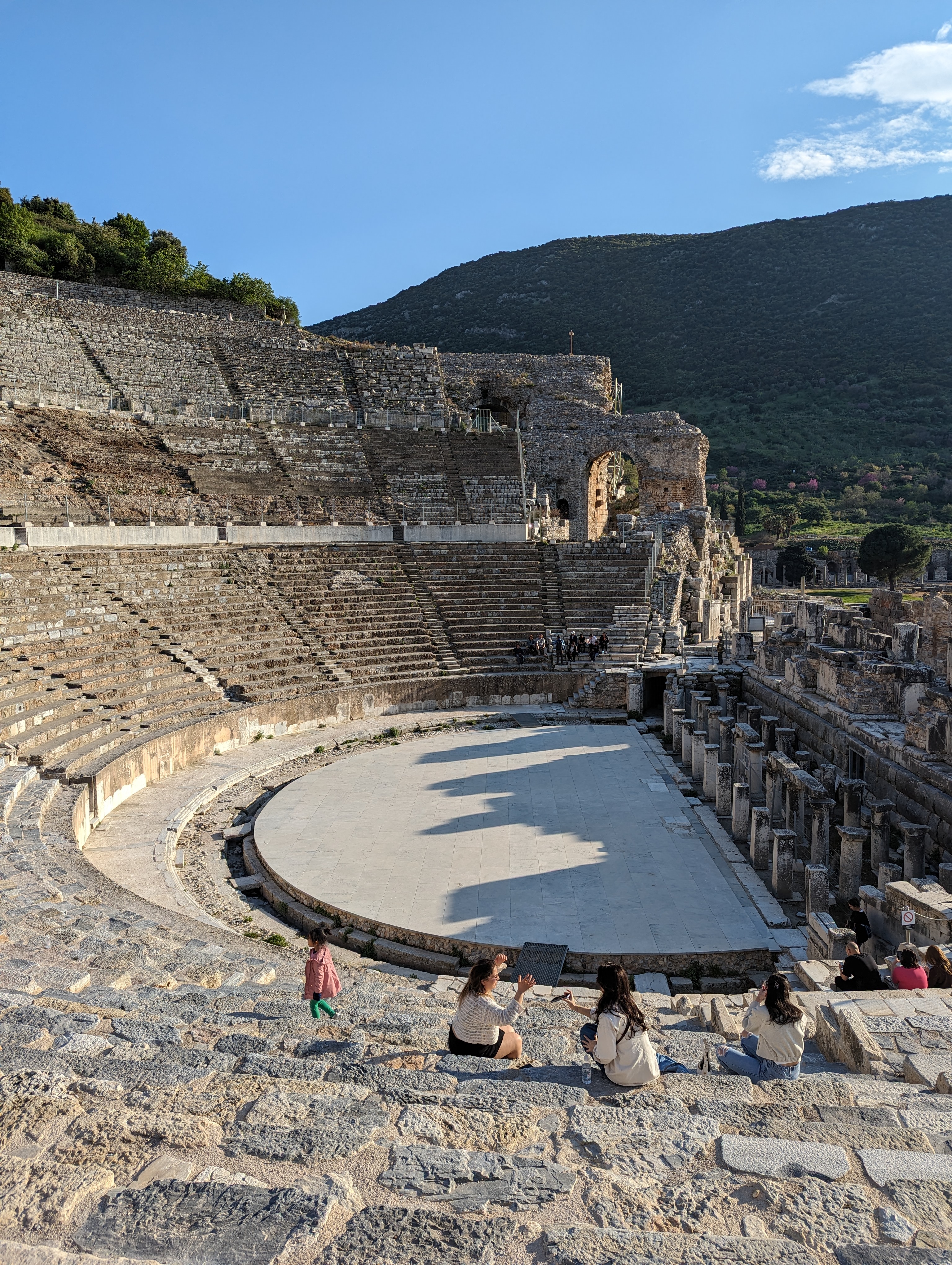
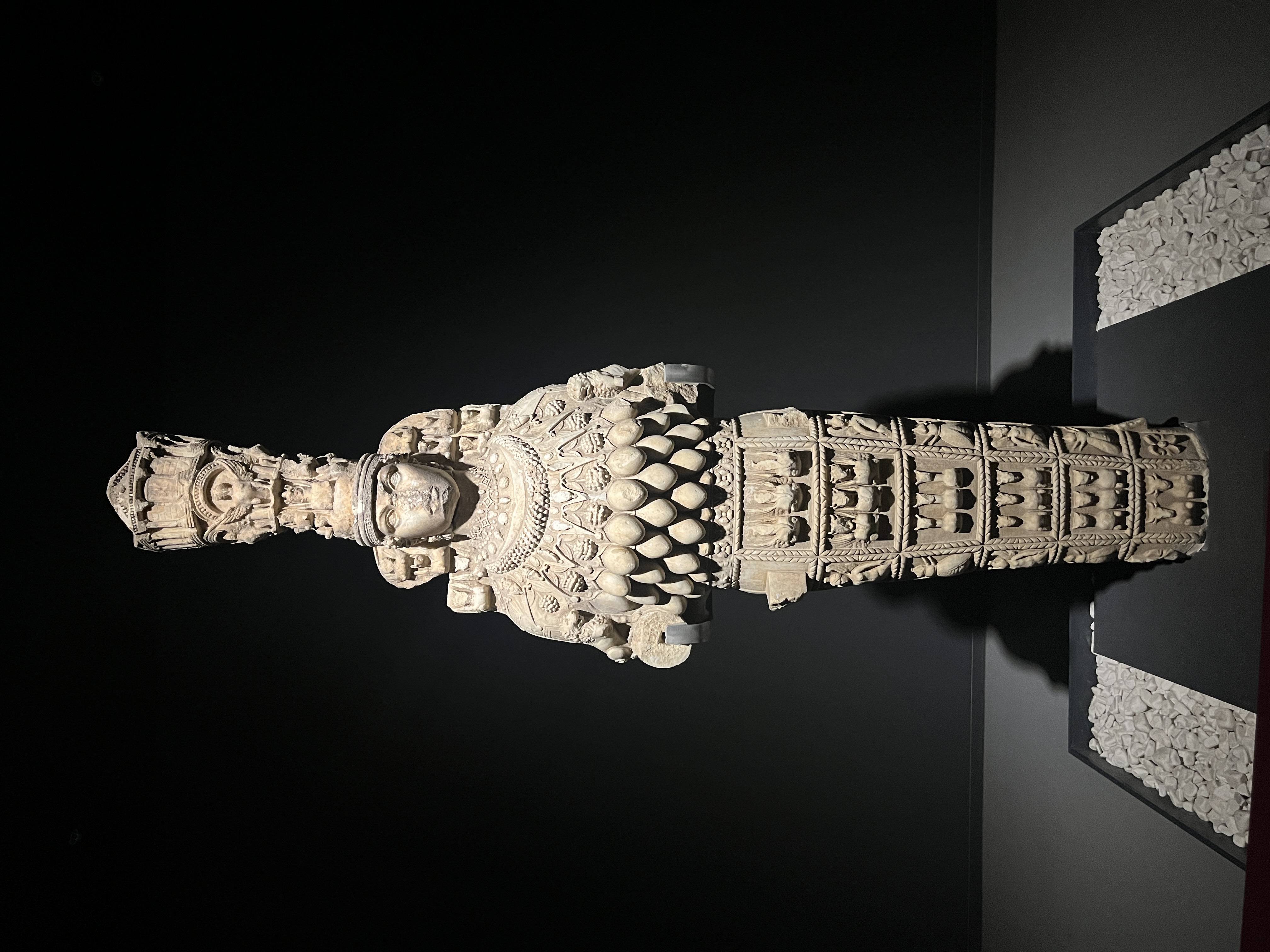
The story continues with a chaotic scene in the amphitheater:
Meanwhile, some were shouting one thing, some another; for the assembly was in
confusion, and most of them did not know why they had come together. Some of the crowd
gave instructions to Alexander, whom the Jews had pushed forward. And Alexander motioned
for silence and tried to make a defense before the people. But when they recognized that
he was a Jew, for about two hours all of them shouted in unison, “Great is Artemis of
the Ephesians!” But when the town clerk had quieted the crowd, he said, “Citizens of
Ephesus, who is there that does not know that the city of the Ephesians is the temple
keeper of the great Artemis and of the statue that fell from heaven? Since these things
cannot be denied, you ought to be quiet and do nothing rash. You have brought these men
here who are neither temple robbers nor blasphemers of our goddess. If therefore
Demetrius and the artisans with him have a complaint against anyone, the courts are
open, and there are proconsuls; let them bring charges there against one another. If
there is anything further you want to know, it must be settled in the regular assembly.
For we are in danger of being charged with rioting today, since there is no cause that
we can give to justify this commotion.” When he had said this, he dismissed the
assembly.
Acts 19:32-41
And that's where the disturbance in Ephesus ends. The crowd, calmed both by the town
clerk and the even greater threat of retributive violence from the Roman authorities,
disperses and goes back to their business.
But that's not the end for the Christians in Ephesus. Carved into stones all over the
city is the ancient ἸΧΘΥΣ symbol. A combination of Greek letters, it stands for Iesous
(Jesus), Khristos (Anointed), Theou (God), Uios (Son), and Soter (Savior). The letters,
when merged into one, could be used discreetly by Christians, no doubt wary of being
dragged back into the theater, to identify each other and their meeting places.
Here is one such carving in a stone right in front of the amphitheater:
